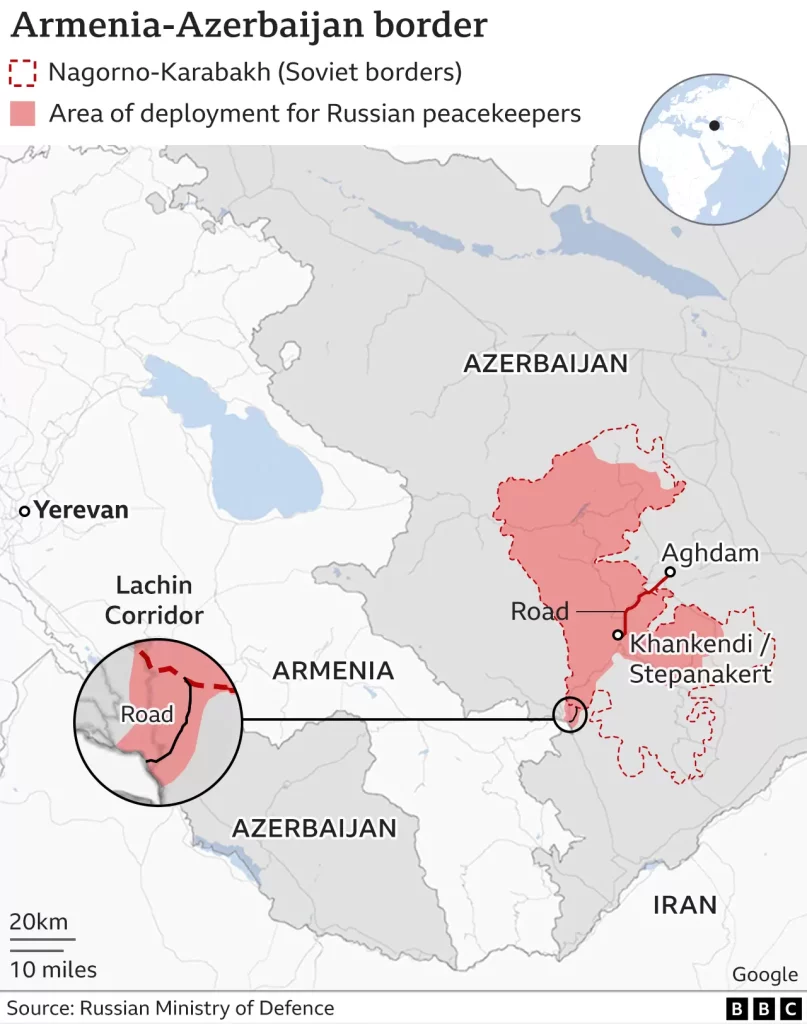Azerbaijan’s defense ministry has initiated “counter-terrorism” operations in Nagorno-Karabakh, a breakaway region under Armenian control. Tensions have remained high for several months in this ethnically Armenian enclave, which is internationally recognized as part of Azerbaijan.
In recent incidents, eleven Azerbaijani police and civilians lost their lives in a mine explosion and another incident. Reports of air raid sirens have emerged from the main city of Karabakh.
Defense authorities in Nagorno-Karabakh have stated that the Azerbaijani military violated the ceasefire by launching missile and artillery strikes along the entire line of contact. Representatives from Nagorno-Karabakh mentioned a “large-scale military offensive” in Armenian media.
Azerbaijan and Armenia, neighboring countries, have engaged in armed conflicts over Nagorno-Karabakh twice, first in the early 1990s following the collapse of the Soviet Union and again in 2020.
Since December, Azerbaijan has effectively blockaded the only route into the enclave from Armenia, known as the Lachin Corridor.
On Tuesday, the defense ministry in Baku accused Armenian forces of continuously shelling army positions and claimed to have responded with “local, anti-terrorist operations” aimed at disarming and securing the withdrawal of Armenian armed forces from Azerbaijani territories. They emphasized that their actions were focused on legitimate military targets and not civilians or civilian facilities, employing high-precision weaponry.
Armenia’s defense ministry refuted the allegations of Armenian fire.
Also Read: Diplomatic Tensions Rise: China Lodges Complaint with Germany Over ‘Dictator’ Remark
The sounds of artillery and gunfire were audible on Tuesday from the Karabakh regional capital, Khankendi (known as Stepanakert to Armenians), where an estimated 120,000 ethnic Armenians reside.
Armenian officials reported that the situation along the country’s borders remained “relatively stable” as of 14:00 (10:00 GMT).
Russia issued a statement urging both countries to honor a ceasefire agreement signed after the 2020 war. During that six-week conflict, Azerbaijan regained control of territories surrounding Karabakh, which had been under Armenian control since 1994. A fragile ceasefire, monitored by approximately 3,000 Russian peacekeepers, has faced increasing challenges, with Russia’s attention diverted by its full-scale invasion of Ukraine. Armenian Prime Minister Nikol Pashinyan recently stated that Russia was “spontaneously leaving the region.”
Azerbaijan has denied any troop buildup in the region and, on Monday, permitted aid from the International Committee of the Red Cross to enter Karabakh via two routes: one through the Lachin Corridor from Armenia and the other along Azerbaijan’s Aghdam road.


